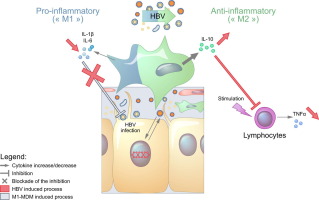当前位置:
X-MOL 学术
›
J. Hepatol.
›
论文详情
Our official English website, www.x-mol.net, welcomes your
feedback! (Note: you will need to create a separate account there.)
Hepatitis B Virus-induced modulation of liver macrophage function promotes hepatocyte infection
Journal of Hepatology ( IF 26.8 ) Pub Date : 2019-12-01 , DOI: 10.1016/j.jhep.2019.06.032 Suzanne Faure-Dupuy 1 , Marion Delphin 2 , Ludovic Aillot 2 , Laura Dimier 2 , Fanny Lebossé 3 , Judith Fresquet 2 , Romain Parent 2 , Matthias Sebastian Matter 4 , Michel Rivoire 5 , Nathalie Bendriss-Vermare 2 , Anna Salvetti 2 , Danijela Heide 6 , Lalo Flores 7 , Klaus Klumpp 7 , Angela Lam 7 , Fabien Zoulim 8 , Mathias Heikenwälder 6 , David Durantel 9 , Julie Lucifora 2
Journal of Hepatology ( IF 26.8 ) Pub Date : 2019-12-01 , DOI: 10.1016/j.jhep.2019.06.032 Suzanne Faure-Dupuy 1 , Marion Delphin 2 , Ludovic Aillot 2 , Laura Dimier 2 , Fanny Lebossé 3 , Judith Fresquet 2 , Romain Parent 2 , Matthias Sebastian Matter 4 , Michel Rivoire 5 , Nathalie Bendriss-Vermare 2 , Anna Salvetti 2 , Danijela Heide 6 , Lalo Flores 7 , Klaus Klumpp 7 , Angela Lam 7 , Fabien Zoulim 8 , Mathias Heikenwälder 6 , David Durantel 9 , Julie Lucifora 2
Affiliation

|
BACKGROUND AND AIMS
Liver macrophages can be both involved in pathogen clearance and/or pathogenesis. To get further insight on their role during chronic hepatitis B virus (HBV) infections, our aim was to phenotypically and functionally characterize in vivo and ex vivo the interplay between HBV, primary human liver macrophages (PLM) and primary blood monocytes differentiated into pro-inflammatory or anti-inflammatory macrophages (M1-MDM or M2-MDM, respectively). RESULTS
We evidenced the presence of HBc protein within macrophages in liver biopsies from HBV-infected patients and higher levels of anti-inflammatory macrophages markers, compared to non-infected ones. Ex vivo exposure of naive PLM to HBV led to a reduced secretion of pro-inflammatory cytokines. Upon exposure to HBV or HBV-producing cells during differentiation and activation, M1-MDM secreted less IL-6 and IL-1β, whereas M2-MDM secreted more IL-10 when exposed to HBV during activation. Finally, cytokines produced by M1-MDM, but not those produced by HBV-exposed M1-MDM, decreased HBV infection of hepatocytes. CONCLUSIONS
Altogether, our data strongly suggest that HBV modulates liver macrophage functions to favour its establishment. LAY SUMMARY
HBV modulates liver macrophages function in order to favour its establishment and likely its maintenance. It impairs the production of the antiviral cytokine IL-1β while promoting that of IL-10 in the microenvironment. This phenotype can be recapitulated in naive liver macrophages or monocytes-derived-macrophages ex vivo by short exposure to the virus or cells replicating the virus, thus suggesting an "easy to implement" mechanism of inhibition.
中文翻译:

乙型肝炎病毒诱导的肝脏巨噬细胞功能调节促进肝细胞感染
背景和目的 肝巨噬细胞可参与病原体清除和/或发病机制。为了进一步了解它们在慢性乙型肝炎病毒 (HBV) 感染中的作用,我们的目标是在体内和体外表征 HBV、原代人肝巨噬细胞 (PLM) 和原代血液单核细胞之间的相互作用,并分化为促炎性或抗炎性巨噬细胞(分别为 M1-MDM 或 M2-MDM)。结果 我们证明了 HBV 感染患者的肝活检中巨噬细胞中存在 HBc 蛋白,并且与未感染的患者相比,抗炎巨噬细胞标志物的水平更高。将幼稚 PLM 体外暴露于 HBV 导致促炎细胞因子的分泌减少。在分化和激活过程中接触 HBV 或 HBV 产生细胞后,M1-MDM 分泌较少的 IL-6 和 IL-1β,而 M2-MDM 在激活期间暴露于 HBV 时分泌更多的 IL-10。最后,由 M1-MDM 产生的细胞因子,而不是由暴露于 HBV 的 M1-MDM 产生的细胞因子,减少了肝细胞的 HBV 感染。结论 总而言之,我们的数据强烈表明 HBV 调节肝脏巨噬细胞功能以促进其建立。概述 HBV 调节肝脏巨噬细胞的功能,以促进其建立和维持。它损害抗病毒细胞因子 IL-1β 的产生,同时促进微环境中 IL-10 的产生。通过短时间暴露于病毒或复制病毒的细胞,可以在幼稚肝巨噬细胞或单核细胞衍生的巨噬细胞体外重现这种表型,从而表明一种“易于实施”的抑制机制。而 M2-MDM 在激活期间暴露于 HBV 时会分泌更多的 IL-10。最后,由 M1-MDM 产生的细胞因子,而不是由暴露于 HBV 的 M1-MDM 产生的细胞因子,减少了肝细胞的 HBV 感染。结论 总而言之,我们的数据强烈表明 HBV 调节肝脏巨噬细胞功能以促进其建立。概述 HBV 调节肝脏巨噬细胞的功能,以促进其建立和维持。它损害抗病毒细胞因子 IL-1β 的产生,同时促进微环境中 IL-10 的产生。通过短时间暴露于病毒或复制病毒的细胞,可以在幼稚肝巨噬细胞或单核细胞衍生的巨噬细胞体外重现这种表型,从而表明一种“易于实施”的抑制机制。而 M2-MDM 在激活期间暴露于 HBV 时会分泌更多的 IL-10。最后,由 M1-MDM 产生的细胞因子,而不是由暴露于 HBV 的 M1-MDM 产生的细胞因子,减少了肝细胞的 HBV 感染。结论 总而言之,我们的数据强烈表明 HBV 调节肝脏巨噬细胞功能以促进其建立。概述 HBV 调节肝脏巨噬细胞的功能,以促进其建立和维持。它损害抗病毒细胞因子 IL-1β 的产生,同时促进微环境中 IL-10 的产生。通过短时间暴露于病毒或复制病毒的细胞,可以在幼稚肝巨噬细胞或单核细胞衍生的巨噬细胞体外重现这种表型,从而表明一种“易于实施”的抑制机制。
更新日期:2019-12-01
中文翻译:

乙型肝炎病毒诱导的肝脏巨噬细胞功能调节促进肝细胞感染
背景和目的 肝巨噬细胞可参与病原体清除和/或发病机制。为了进一步了解它们在慢性乙型肝炎病毒 (HBV) 感染中的作用,我们的目标是在体内和体外表征 HBV、原代人肝巨噬细胞 (PLM) 和原代血液单核细胞之间的相互作用,并分化为促炎性或抗炎性巨噬细胞(分别为 M1-MDM 或 M2-MDM)。结果 我们证明了 HBV 感染患者的肝活检中巨噬细胞中存在 HBc 蛋白,并且与未感染的患者相比,抗炎巨噬细胞标志物的水平更高。将幼稚 PLM 体外暴露于 HBV 导致促炎细胞因子的分泌减少。在分化和激活过程中接触 HBV 或 HBV 产生细胞后,M1-MDM 分泌较少的 IL-6 和 IL-1β,而 M2-MDM 在激活期间暴露于 HBV 时分泌更多的 IL-10。最后,由 M1-MDM 产生的细胞因子,而不是由暴露于 HBV 的 M1-MDM 产生的细胞因子,减少了肝细胞的 HBV 感染。结论 总而言之,我们的数据强烈表明 HBV 调节肝脏巨噬细胞功能以促进其建立。概述 HBV 调节肝脏巨噬细胞的功能,以促进其建立和维持。它损害抗病毒细胞因子 IL-1β 的产生,同时促进微环境中 IL-10 的产生。通过短时间暴露于病毒或复制病毒的细胞,可以在幼稚肝巨噬细胞或单核细胞衍生的巨噬细胞体外重现这种表型,从而表明一种“易于实施”的抑制机制。而 M2-MDM 在激活期间暴露于 HBV 时会分泌更多的 IL-10。最后,由 M1-MDM 产生的细胞因子,而不是由暴露于 HBV 的 M1-MDM 产生的细胞因子,减少了肝细胞的 HBV 感染。结论 总而言之,我们的数据强烈表明 HBV 调节肝脏巨噬细胞功能以促进其建立。概述 HBV 调节肝脏巨噬细胞的功能,以促进其建立和维持。它损害抗病毒细胞因子 IL-1β 的产生,同时促进微环境中 IL-10 的产生。通过短时间暴露于病毒或复制病毒的细胞,可以在幼稚肝巨噬细胞或单核细胞衍生的巨噬细胞体外重现这种表型,从而表明一种“易于实施”的抑制机制。而 M2-MDM 在激活期间暴露于 HBV 时会分泌更多的 IL-10。最后,由 M1-MDM 产生的细胞因子,而不是由暴露于 HBV 的 M1-MDM 产生的细胞因子,减少了肝细胞的 HBV 感染。结论 总而言之,我们的数据强烈表明 HBV 调节肝脏巨噬细胞功能以促进其建立。概述 HBV 调节肝脏巨噬细胞的功能,以促进其建立和维持。它损害抗病毒细胞因子 IL-1β 的产生,同时促进微环境中 IL-10 的产生。通过短时间暴露于病毒或复制病毒的细胞,可以在幼稚肝巨噬细胞或单核细胞衍生的巨噬细胞体外重现这种表型,从而表明一种“易于实施”的抑制机制。











































 京公网安备 11010802027423号
京公网安备 11010802027423号